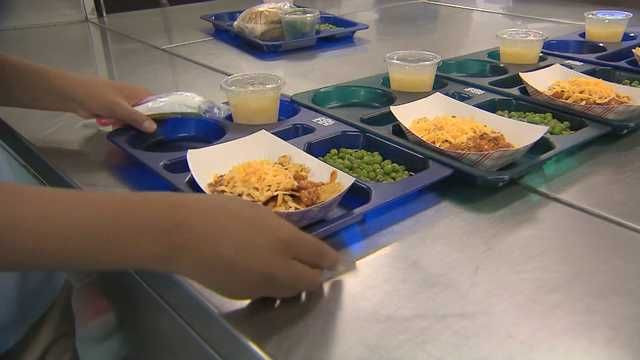BURGETTSTOWN, Pa. (WTAE) -- A high school student is hoping to make adjustments to a nationwide program aimed at providing healthier foods in schools.
Kaden Pugh took the idea at first to his student council and the head of the kitchen in his high school, but realized this was an issue bigger than just Washington County. He wants to take this to Washington, D.C., to President Donald Trump and the secretary of agriculture.
"It wouldn’t just work at our school because this plan is a nationwide issue, so it would not just have to be our school. I just think that I'm speaking for a lot of kids, not just only in the community but in America," Pugh said.
Pugh, a junior at Burgettstown Area Middle/High School, started this petition Wednesday. In just under 24 hours, the petition gained over 1,100 signatures. His goal is to voice concerns over regulated school lunch programs enacted under the Obama administration.
But it wasn’t just the petition. Pugh, also on the student council, took it before the council and even addressed the head of the kitchen.
"It went pretty well. He received the feedback pretty well. It was a lot of critiquing, foods kids wanted, the problems with the bread, stuff like that. It's not like they’re not trying to, but this is kind of a roadblock," Pugh said.
Pugh says his concern isn’t with healthy food itself; commends that initiative. It’s more about portion sizes, food waste and reducing financial strain on schools, especially lower-income schools.
"Having healthy food that tastes good just isn’t always an option because healthy food is expensive, and they’re on a short budget," Pugh said.
You may be wondering about the correlation between it all, like how do these regulations lead to food waste? Pugh says it’s simple.
"They throw away half of their meals because, halfway through, their stomachs start hurting or they just don’t like it. The food has to be 51% whole grain. Also, it’s all gluten-free. I feel like the fruits and vegetables aren’t always fresh, and sometimes the lettuce is soggy. The bread is not appeasing," Pugh said.
And portion size, he says, doesn’t provide the correct nourishment to students, especially athletes, because of strict calorie regulations.
"We get, like, four little nuggets — they are not big at all. I asked about it, and he said it’s not about the portion size. It’s about the weight of the food because they have a certain amount of calories per week because of this plan," Pugh said.
The current regulation requires lunches and breakfasts to have more whole grains, vegetables and fruits, and less fat and sodium, and set sensible calorie limits based on the age of children being served.

 Trump has begun another trade war. Here's a timeline of how we got here
Trump has begun another trade war. Here's a timeline of how we got here
 Canada's leader laments lost friendship with US in town that sheltered stranded Americans after 9/11
Canada's leader laments lost friendship with US in town that sheltered stranded Americans after 9/11
 Chinese EV giant BYD's fourth-quarter profit leaps 73%
Chinese EV giant BYD's fourth-quarter profit leaps 73%
 You're an American in another land? Prepare to talk about the why and how of Trump 2.0
You're an American in another land? Prepare to talk about the why and how of Trump 2.0
 Chalk talk: Star power, top teams and No. 5 seeds headline the women's March Madness Sweet 16
Chalk talk: Star power, top teams and No. 5 seeds headline the women's March Madness Sweet 16
 Purdue returns to Sweet 16 with 76-62 win over McNeese in March Madness
Purdue returns to Sweet 16 with 76-62 win over McNeese in March Madness








